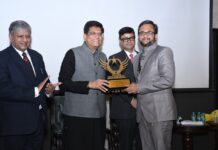By Dr. Anupam Narula, Professor of Marketing, Amity School of Business, Amity University, Noida, India.
Knowledge creation and research are critical in growing and sustaining a large and vibrant economy, uplifting society, and continuously inspiring a nation to achieve even greater heights.Research and innovation in management discipline along with innovations in the science and technology are therefore, extremely important for the progress and enlightened nature of a nation.Evidence from the world’s best business schools throughout history shows that the best teaching and learning processes at the higher management education level occur in environments where there is also a strong culture of research and knowledge creation in multidisciplinary settings.
Do you think Indian Business schools are on the right track for conducting management research and knowledge creation?
For many years MBA programme enjoyed respectability in academia and corporate business world. The admissions were more selective, pay packages of graduates more attractive. Today MBA’s programmes are losing its sheen due to intense criticism for failing to impart useful practical skills relevant to employers, not able to prepare leaders for Industry 4.0, failing to instil ethical and moral values in graduates and finally even failing to lead graduates to good corporate jobs.
The criticism comes from employers who say that only 10 percent of the MBA graduates from Indian B-schools are employable after completing the course. The main cause is far broader in scope and can be traced to dramatic shift in the working culture of business schools in India. The past several years many leading business schools in India have replicated the model of academic excellence from the west.The rigor has been more on technical research rather than business research. They have adopted a model of science that uses abstract statistical, financial and econometrics models which are very good on theoretical aspect but have very little practical relevance to practitioners dealing with contemporary issues in corporate world.
 The reason is that Indian business schools have started rewarding their faculty on two parameters. First, they are rewarded for the number of technical papers that they publish in reputed journals that are exclusively controlled by, and read by, other academicians.Second, they are rewarded by their citation count – the number of times their articles are cited by other academicians in their research. These incentives mean business schools professors spend most of their time searching for research areas they think will get published in reputed journals and to increase citation counts rather than searching for contemporary business problems which can be of practical use to the corporate world and can be used as experiential learning to teach in the class room setting. Professors who are practitioners and conduct business research and attend industry conferences decreases their chances of performing well on publication and cite counts and hence not rewarded. This can be termed as ‘Research Fallacy’ which has lead business schools in India to disconnect from practice oriented and experiential learning.
The reason is that Indian business schools have started rewarding their faculty on two parameters. First, they are rewarded for the number of technical papers that they publish in reputed journals that are exclusively controlled by, and read by, other academicians.Second, they are rewarded by their citation count – the number of times their articles are cited by other academicians in their research. These incentives mean business schools professors spend most of their time searching for research areas they think will get published in reputed journals and to increase citation counts rather than searching for contemporary business problems which can be of practical use to the corporate world and can be used as experiential learning to teach in the class room setting. Professors who are practitioners and conduct business research and attend industry conferences decreases their chances of performing well on publication and cite counts and hence not rewarded. This can be termed as ‘Research Fallacy’ which has lead business schools in India to disconnect from practice oriented and experiential learning.
The new NEP 2020 will help business schools in India to emerge from this fallacy by integrating technical research outcomes with practice oriented business research which is relevant to Government as well as Industry 4.0.This has been achieved through five ways as follows:
First the greatest emphasis in NEP 2020 has been given towards a more holistic and vibrant multidisciplinary education which will enable and encourage high-quality multidisciplinary and cross-disciplinary teaching and research across different domains. This overall culture of empowerment and autonomy to innovate will help management graduates to choose novel and engaging course options in addition to rigorous specialization in a subject or subjects that are relevant as per 21st century skills required by the Industry 4.0.This will also bring flexibility in approach leading to positive learning outcomes, including increased creativity and innovation, critical thinking, higher-order thinking capacities, problem-solving abilities, teamwork, communication skills, more in-depth learning and mastery of curricula across fields, increases in social and moral awareness besides general engagement and enjoyment of learning. Business research will also improve and enhance through a holistic and multidisciplinary education approach.
Second it has been rightly addressed by creation of National Research Foundation (NRF) which will competitively fund research in all disciplines and will recognise practical and relevant research implemented through close linkages with governmental agencies as well as with industry and private/philanthropic organizations.It will also act as a liaison between researchers and relevant branches of government as well as industry to constantly make aware of the most urgent national and business research issues in the country. The latest research breakthroughs will be made aware to policymakers; so as to allow those breakthroughs to be optimally brought into policy and/or practical implementation in the society.
Third the General Education Council (GEC), the vertical under the main umbrella of Higher Education Commission of India (HECI)will frame expected learning outcomes and will be mandated to identify specific skills that are required by management students in their academic programmes, with the aim of preparing holistic and multidisciplinary learners required by the present Industry 4.0.
Fourth Public-private Philanthropic Partnership models will be designed where big corporate houses are to be approached to fund studies or collaborate to create start-up incubation centers, technology development centers, centers in frontier areas of business research; greater industry-academic linkages, and interdisciplinary research and innovation in the high priority area as per current business requirement. These centers will foster and support this very spirit of knowledge creation, insight and implementation in advancing industry 4.0 practices.
Fifth the most important factor in the success of management education is the quality and engagement of its faculty. The business schools are required to hire blend of academicians and practicing professors who are good in technical research and are involved in applying the outcome for solving the business problems.The business school faculty to be exclusively rewarded on business consulting activity that comes out of business research.
Making professors to rethink on research requires leaders of business schools to act as catalyst to bring institutional change as suggested above. While such changes are not very easy to implement but those business schools who have excellent pool of faculty in technical research need to apply this knowledge creation to the issues of business organisation, who ultimately hire these management graduates.This will lead to natural imparting of practice oriented teaching and experiential learning to MBA graduates in the class room setting as per contemporary industry 4.0 requirements and hence will bridge the gap between industry–academia which exists in Indian business schools.






























